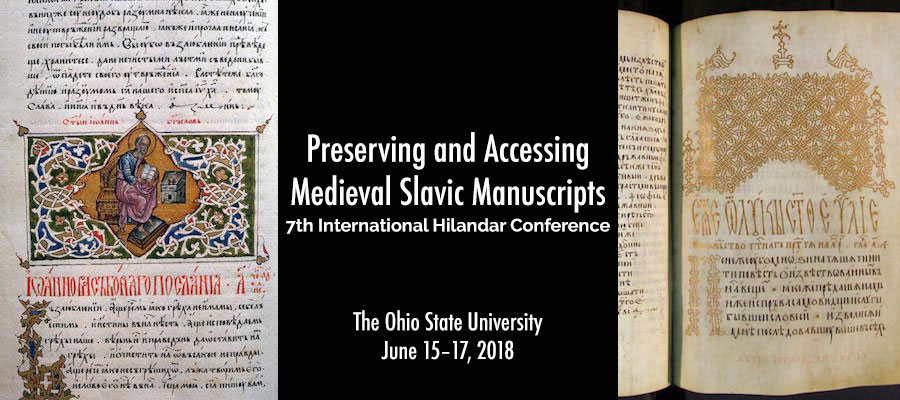Preserving and Accessing Medieval Slavic Manuscripts, 7th International Hilandar Conference, The Ohio State University, June 15–17, 2018
The international series of Hilandar conferences began at The Ohio State University in April 1981 when medieval Slavic scholars from 19 different countries came to Columbus to show their appreciation and support for what was then the Hilandar Research Project (HRP). The HRL, at the invitation of the monks, had microfilmed at Hilandar Monastery nearly 1,000 Cyrillic manuscripts and over 400 medieval charters and edicts (Slavic, Greek, Ottoman and Wallacho-Moldavian), thus creating for the first time opportunities for scholars, especially female scholars (who cannot work with the originals on Mount Athos), to conduct research of nearly 500,000 pages of what was then largely unresearched material.
The conference theme "Preserving and Accessing Medieval Slavic Manuscripts" is broadly conceived and, as always at an International Hilandar Conference, papers about Hilandar Monastery, its written heritage and scribal traditions in the fields of art history, history, literature, linguistics, theology, etc., are welcome. Papers that compare medieval Slavic to other manuscript traditions will also be considered, as will presentations about the establishment of similar libraries and centers that preserve a cultural heritage and promote scholarly access to its materials.
Possible session topics related to medieval Slavic manuscripts include:
- Conservation and Preservation
- Description and cataloging
- Microfilming, Digitization, and/or Digital Humanities
- Watermarks
- Hymnography
- Acrostics and other hidden information in manuscripts
- Teaching medieval Slavic manuscripts
- Medieval Slavic texts preserved in other traditions
- Hilandar Monastery Manuscripts (Slavic and Greek), Scribes
- Hilandar Monastery Edicts – Slavic, Greek, Ottoman, and/or Wallacho-Moldavian
We also welcome papers from alumni of the HRL/RCMSS Medieval Slavic Summer Institute on a variety of topics.
We invite scholars (researchers, faculty, independent scholars, conservators, librarians, graduate students, etc.) to submit abstracts.
